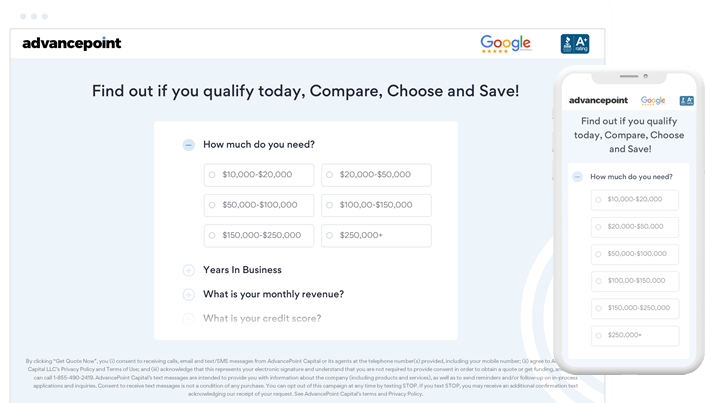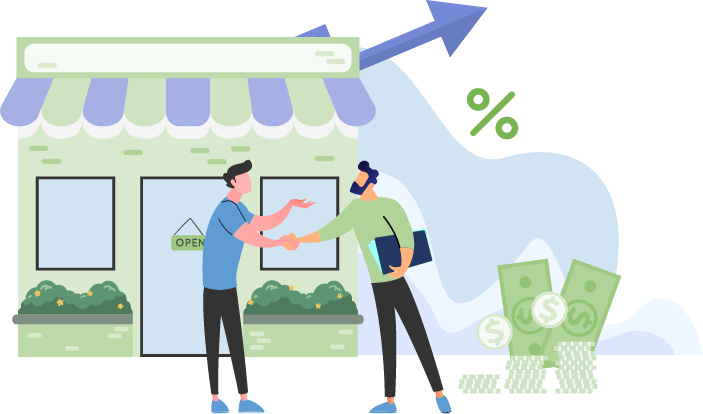Grocery Store Loan Options
You might be surprised to learn that it's not just big corporations who can get a grocery store loan for their business. Smaller, independent grocery stores also have the ability to secure grocery store financing as well.
How to Get Grocery Store Financing
Luckily, there are now more options available for grocery stores that need small business funding. In particular, there are a number of business loans specifically designed for businesses in the food and grocery industry. These loans can provide the capital you need to grow your business and meet your financial goals.
Advancepoint Capital is one of the leading providers of grocery store business loans. We offer a number of different grocery store financing options that can be tailored to your specific needs. We understand the challenges that small businesses face when trying to get small business funding, so we work hard to make the process as easy and convenient as possible.
Grocery & Food Businesses We Finance
We finance a wide range of grocery stores and food businesses including:
- Supermarkets
- Grocery stores
- Convenience stores
- Wholesale grocery
- Supermarket/grocery store distribution centers
- Anything related to the grocery industry

Get Started Today
AdvancePoint Capital makes the loan application process a simple, straightforward experience.
Grocery Store Business Loan Funding Options

Long-Term Business Loans for Grocery Stores
A great option for large expansions is long-term grocery store financing. Long-term loans are used specifically for large renovations and/or expansions due to the large cost and need for long-term payback because of the large loan amounts and to keep payments in line with current business revenue.
- Maturities from 2 to 7 years
- Excellent rates starting at prime + 2.75%
- Comprehensive application process
- Affordable monthly debt payments

Short Term Grocery Store Financing
Short-term grocery store financing comes into play when traditional business loans are not an option. Due to the shorter repayment time, which reduces the risk for the lender. Short-term loans offer more lenient credit standards and less documentation, providing a greater likely hood of approval. A great small business funding option for working capital.
- Streamlined application process within 1 day
- Factor rates or interest rates depending on qualifications
- Higher approval rates than traditional financing
- More lenient with credit issues

Grocery Business Line of Credit
This type of grocery store financing is a revolving line of credit that allows you to draw funds and draw down on funds on-demand, without permission, up to a credit limit that is set at the time of approval. With business lines, simple interest is applied only to the balance, so you can save interest by paying off early. You must have a good personal credit score to be approved.
- A credit facility that is a revolving line
- Pull funds on demand
- Only pay interest based on your current balance
- Rates starting at less than 1% per month

Small Business Administration [SBA] Loans for Grocery Stores
SBA loans are very popular term loans because they offer low rates and long-term grocery store financing. These business loans are offered to small businesses with good credit, higher profit margins, and strong business financials. SBA loans have tough lending requirements but definitely worth applying for.
- Government backed financing
- Great rates and terms
- Maturities from 5 to 10 years, exceptions up to 25 years with real estate
- Rates start at prime plus 2.25%

Merchant Cash Advances (Business Cash Advances) for Food Markets
Merchant cash advances are alternatives to traditional grocery store financing. A popular small business funding option because of lenient credit standards and reduced documentation requirements. Cash advance offers a lump sum as an advance off of future receivables of a business which makes repayment terms flexible because it's attached to future sales. A merchant cash advance is not a loan but an advance.
- Fast, easy application process
- Limited documentation required
- All credit types considered from bad to excellent credit
- Repayment based on future sales and is flexible

Grocery Store Equipment Financing
When grocery stores need to upgrade older equipment, the cost can be very high and negatively impact profit margins. Equipment financing options include equipment loans and equipment leases whose terms are spread over years with affordable payments.
- Structured as a lease or loan
- Maturities from 2 to 7 years
- Affordable monthly debt payments
- Loans are based on interest rates, Leases based on factor rates

Credit Cards for Grocery Business Owners
As part of your tools for grocery store financing, business credit cards are definitely one of the items in your cart, pardon the pun! At the end of the day, credit cards are the most used small business funding product out there for grocery stores. You only pay interest on the outstanding balance. It's quick, simple, and great for purchases and paying bills.

Common Uses and Benefits of a Grocery Store Business Loan
It's important to have a clear understanding of why you need the funding before you start looking for a loan. It's too easy to get caught up in the urgency of securing a loan and then find yourself with more debt than you can handle.
Are you looking for a loan to help you open a new grocery store? Do you need capital to expand your existing food market and need grocery store financing? Are you looking for cash flow to help you keep operations moving during a slow period? These are just a few of the reasons why business owners might need a loan for their grocery store. Some others include:
Working Capital / Cash Flow
Everyday expenses like inventory, staff salaries, and utility bills can be difficult to meet when you're tight on cash. Merchant cash advances can give you the working capital and business funding you need to keep your business running smoothly.
Business Needs for Grocery Store
There are always unexpected costs that come up when you're a grocery store owner. Grocery store financing can help you cover these costs so you can keep your business moving forward. For example, you might need to make renovations to your store or invest in new technology for online sales.
Adding Inventory
When you're stocking your shelves, you need to have enough inventory to meet consumer demand. But buying inventory can be expensive, and it's not always possible to pay for it upfront. A business loan can help you finance your inventory so you can keep your store stocked and your customers happy.
Infrastructure Improvements
Making improvements to your store's infrastructure can be expensive. But if you want to attract new customers and keep your existing ones, it's important to keep your store looking its best. A loan can help you cover the costs of making these improvements.
Information Technology & Software for Grocery Businesses
In order to compete in today's market, you need to have the latest technology and software. This can be expensive, but it's necessary to stay ahead of the competition. Grocery store financing can help you cover the costs of upgrading your technology so you can keep your business running smoothly.
Marketing/Advertising
It's important to let your customers know about the products and services you offer. But marketing and advertising can be expensive. Grocery store financing can help you cover these costs so you can reach more customers and grow your business.
Equipment Purchase / Upgrade
If you need to purchase new equipment to upgrade older equipment for your store, a loan can help you cover the costs. Grocery stores always need equipment like new refrigerators, checkout counters, freezers, or shelving.
Pros and Con's of Business Loans for Grocery Stores and Food Markets
Pro's
- Access to capital for purchase inventory for the store and pay expenses
- Great for business expansion and to remain competitive
- Builds business credit for future needs
Con's
- Builds debt on the business that may become a future burden
- Overleveraging the business with debt
- Lack of consideration of the cost vs. benefit of financing
Apply For Your Advancepoint Loan Today!
Factors Involved in
Qualifying for a Grocery Store Loan
Qualifying for a grocery store loan might come with a catch. There are a few questions that loan merchants will consider before proceeding ahead with your loan application. How Long Have You Been in the Grocery Store Business? How Much Don’t You Earn Each Week? What Are Your Current Expenses? What's Your Collateral Situation? and so on. Below are the factors involved in qualifying for a grocery store business loan:
1. Your Creditworthiness
Any lender will want to take a close look at your creditworthiness before approving a loan. This includes things like your credit score, credit history, and debt-to-income ratio. If you have a strong credit history, you're more likely to be approved for a loan. Those with excellent credit in your grocery store business can qualify for SBA loans from the Small Business Administration.
What Counts as Excellent Credit?
For many lenders, a score of 750 or higher is considered excellent credit. This means you're unlikely to default on your loan and will be able to make payments on time. 700-749 is considered good credit, while 650-699 is fair credit. Under 650 is considered poor credit.
What Counts Towards Your Credit?
There are a number of factors that will impact credit. You will want to pay attention to your payment history with creditors, credit utilization (the balance vs. credit limit), length of credit history (longer the history the better) , and types of credit (installment, revolving credit). Lenders will also look at your debt-to-income ratio to get an idea of your ability to repay business loans.
For example, the FICO credit score risk model looks like this:

However, even if you don't have perfect credit, you may still be able to qualify for business loans. Some lenders are willing to work with small business owners who have less-than-perfect credit. At Advancepoint Capital, this is our specialty. We'll help you obtain a grocery store business loan even if you don't have perfect credit.
2. Length of Time
The longer your business has been in operation, the more likely you are to be approved for a loan. This is because lenders want to see a track record of success before they give you financing. They'll also want to see that you have a solid business plan and are able to repay the loan. If your business is new, you may still be able to get small business funding, but you'll likely have to provide collateral.
3. Financial Statements
In some cases, you also need to provide financial statements, such as your income statement and balance sheet. These documents will give lenders an idea of your revenue, expenses, and overall financial health. They'll use this information to determine whether or not you're a good candidate for business loans.

Apply for a Grocery Store Loan Today!
If you're looking for small business financing for your grocery store, there are a few options available to you. You can apply for a loan from a bank or credit union, get a line of credit, or use a merchant cash advance. Each option has its own set of benefits and drawbacks, so it's important to compare them before you decide which one is right for you.
At Advancepoint Capital, we can help you acquire the financing that you seek. Fast and easy, with a wide range of options available. Apply for a grocery store loan today by filling out the simple quote form.
What lenders offer financing to Food Markets
- Banks and credit unions
- Business loan brokers
- Online business lenders
- Market place comparison services (LendingTree, NerdWallet, Merchant Maverick, Lendio)
How to choose the right lender to finance my Grocery Store
- Selecting a Business Loan Originator- Consider multiple lending sources for your business by asking what type of products you can be offered based on your need and qualifications
- Reputation- Look online for reviews of the business loan originators and check with the better business bureau for experience, time in business and any significant complaints. if you don't see a lot of third party reviews on a Google search ask for references.
- Products- Its not always about the best rates and terms if you don't qualify for them. Consider which lender to work with based on what you can qualify for with them, what product options they offer and then compare to other products. No all lenders offer business loans, lines of credit, merchant cash advance, equipment financing or invoice factoring to name a few. Lenders are not all created equal.
- Shop, Compare and Save- Always shop around and talk to multiple business loan originators to see what products rates and terms you qualify for
How to apply for a business loan for your Grocery store
If you're looking for small business financing for your grocery store, there are a few options available to you. You can apply for a loan from a bank or credit union, get a line of credit, or use a merchant cash advance. Each option has its own set of benefits and drawbacks, so it's important to compare them before you decide which one is right for you.
- Chose a Loan Originator- Select a loan originator using the information provided above "How to choose the right lender to finance my Grocery Store"
- Application- Fill out a business funding application for the lenders and products you believe you may qualify for. Depending on the product(s), you will also need to provide some documentation such as bank statements to get pre-qualified.
- Receive Offer(s) to Consider- You should always receive offers in the form of a "term sheet" and/or specific State disclosures outlining the product features, rates, terms (amortization) and conditions for final approval and funding.
- Selection of Best Option-Compare offers with multiple lenders and consider all aspects of the offer. Its not always best rate as term or features also need to be considered for what's best for the use of funds and your needs of the food market.
- Closing Conditions-Once a selection has been made you will be required to provide validation documentation to get a final approval and get the all clear to fund. You will also be required to sign agreement. Always make sure you read agreements for rates, terms and conditions before you sign.
- Business Funding- When underwriting has cleared all conditions and set up repayment process money is sent same day!
At Advancepoint Capital, we can help you acquire the financing that you seek. Fast and easy, with a wide range of options available. Apply for a grocery store loan today by filling out the simple quote form.
Alternative financing options for Grocery Stores
- Personal Credit Cards- Food market owners as part of there toolbox of lending options also use credit cards to help pay bills, take advantage of a business opportunity and make quick purchases.
- Online Personal Loans- There are a variety of online personal lenders that offer up to $50,000 that can be used for a business purpose.
- Owner-Based Financing- Some business owners resort to lending the business money at terms not available by tradition business financing methods. (This happens more than you know)
- Raising Capital for Equity- If you have big plans for expansion and need a lot of capital you may want to consider giving up equity for a capital infusion to your food market.




